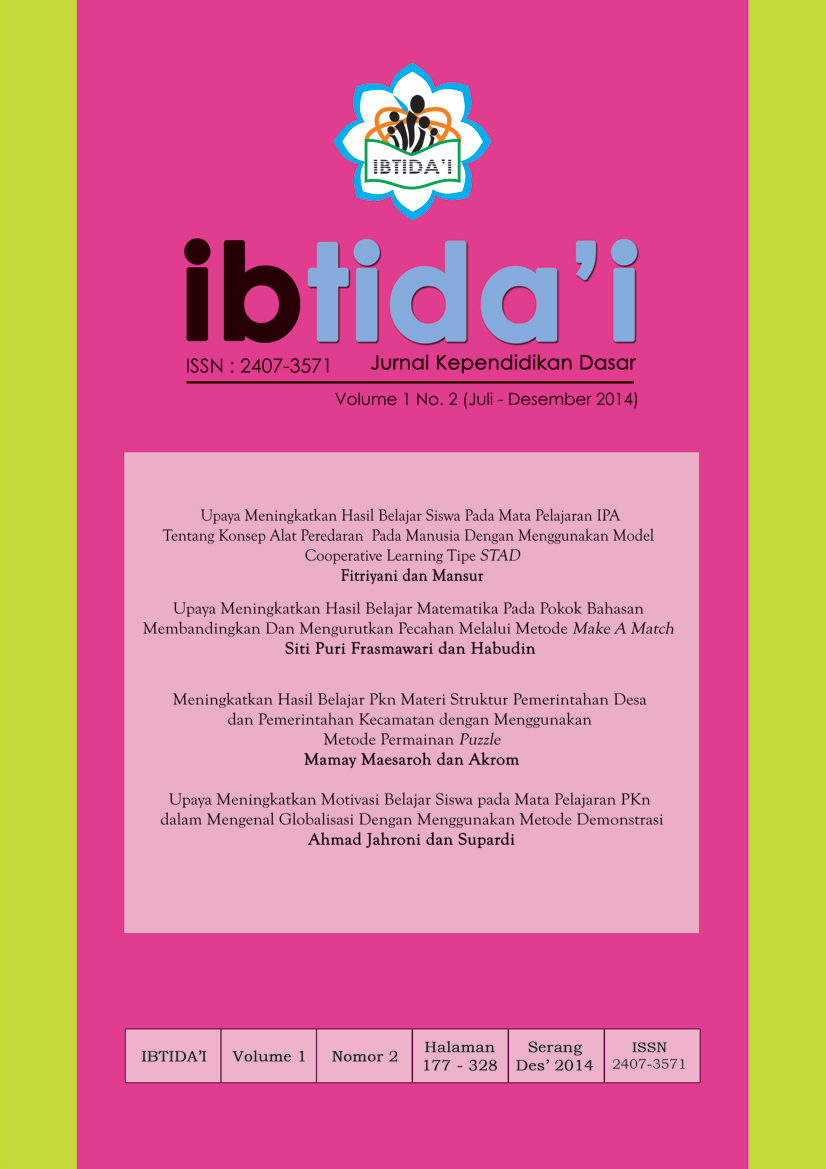EFEKTIVITAS PENERAPAN MODEL CONNECTING, ORGANIZING, REFLECTING, EXTENDING (CORE) TERHADAP KEMAMPUAN PENALARAN ADAPTIF MATEMATIKA
 DOI:
DOI:
https://doi.org/10.32678/ibtidai.v6i02.2497
 Abstract viewed : 201 times
|
Abstract viewed : 201 times
|  pdf (Bahasa Indonesia) downloaded : 246 times
pdf (Bahasa Indonesia) downloaded : 246 times
Keywords:
Model pembelajaran CORE, Penalaran adaptif matematikaAbstract
Tujuan penelitian ini adalah untuk mengetahui bagaimana penerapan dan pengaruh penggunaan model Connecting, Organizing, Reflecting, Extending (CORE) terhadap kemampuan penalaran adaptif matematika. Metode penelitian yang digunakan adalah preeksperimen dengan desain penelitian one group pretest-posttest design dengan sampel 31 siswa. Teknik pengumpulan data yang digunakan berupa tes.Penerapan pembelajaran sebelum menerapkan modelCORE memperoleh nilai rata-rata 45,23 sedangkan pembelajaran sesudah menggunakan model CORE memperoleh nilai rata-rata 84,13. Data yang diperoleh dianalisis dengan menggunakan teknik analisis statistik yaitu, uji Pearson Product Moment dan diperoleh nilai sebesar 7,236 1,699 dengan kriteria thitung ttabel, berdasarkan kriteria nilai tersebut,maka dapat disimpulkan bahwa Ha diterima, artinya adapengaruhyang signifikan terhadap penalaran adaptif matematikadengan menggunakan model pembelajaranCORE.
Downloads
Downloads
Published
How to Cite
Issue
Section
License
Ibtida'i: Jurnal Kependidikan Dasar https://ftk.uinbanten.ac.id/journals/index.php/ibtidai is licensed under aCreative Commons Attribution-ShareAlike 4.0 International License
An author who publishes in Ibtida'i: Jurnal Kependidikan Dasar agrees to the following terms:
- The author retains the copyright and grants the journal the right of first publication of the work simultaneously licensed under the Creative Commons Attribution-ShareAlike 4.0 License that allows others to share the work with an acknowledgement of the work's authorship and initial publication in this journal
- The author can enter into separate, additional contractual arrangements for the non-exclusive distribution of the journal's published version of the work (e.g., post it to an institutional repository or publish it in a book) with the acknowledgement of its initial publication in this journal.
- The author is permitted and encouraged to post his/her work online (e.g., in institutional repositories or on their website) before and during the submission process, as it can lead to productive exchanges, as well as earlier and greater citation of the published work (See The Effect of Open Access).
The names and email addresses entered in this journal site will be used exclusively for the stated purposes of this journal. They will not be made available for any other purpose or to any other party.


















